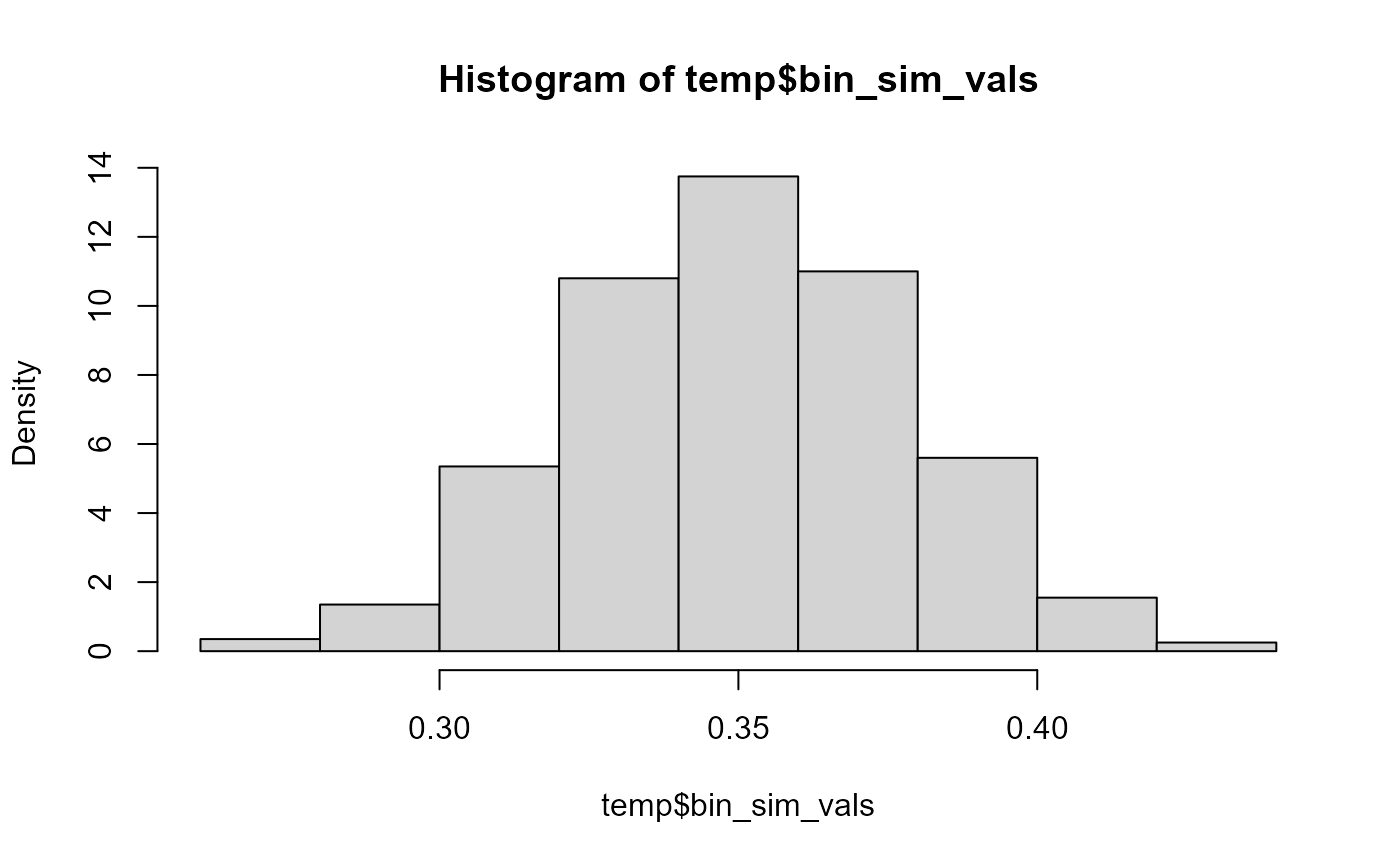Samples from the posterior distribution of the probability \(p\) of a binomial distribution.
Usage
binpost(n, prior, ds_bin, param = c("logit", "p"))Arguments
- n
A numeric scalar. The size of posterior sample required.
- prior
A function to evaluate the prior, created by
set_bin_prior.- ds_bin
A numeric list. Sufficient statistics for inference about a binomial probability \(p\). Contains
n_raw: number of raw observations.m: number of threshold exceedances.
- param
A character scalar. Only relevant if
prior$prioris a (user-supplied) R function.paramspecifies the parameterization of the posterior distribution thatruuses for sampling.If
param = "p"the original parameterization \(p\) is used.If
param = "logit"(the default) thenrusamples from the posterior for the logit of \(p\), before transforming back to the \(p\)-scale.The latter tends to make the optimizations involved in the ratio-of-uniforms algorithm more stable and to increase the probability of acceptance, but at the expense of slower function evaluations.
Value
An object (list) of class "binpost" with components
bin_sim_vals:An
nby 1 numeric matrix of values simulated from the posterior for the binomial probability \(p\)bin_logf:A function returning the log-posterior for \(p\).
bin_logf_args:A list of arguments to
bin_logf.
If prior$prior is a (user-supplied) R function then this list
also contains ru_object the object of class "ru"
returned by ru.
Details
If prior$prior == "bin_beta" then the posterior for \(p\)
is a beta distribution so rbeta is used to
sample from the posterior.
If prior$prior == "bin_mdi" then
rejection sampling is used to sample from the posterior with an envelope
function equal to the density of a
beta(ds$m + 1, ds$n_raw - ds$m + 1) density.
If prior$prior == "bin_northrop" then
rejection sampling is used to sample from the posterior with an envelope
function equal to the posterior density that results from using a
Haldane prior.
If prior$prior is a (user-supplied) R function then
ru is used to sample from the posterior using the
generalised ratio-of-uniforms method.
See also
set_bin_prior for setting a prior distribution
for the binomial probability \(p\).
Examples
u <- quantile(gom, probs = 0.65)
ds_bin <- list()
ds_bin$n_raw <- length(gom)
ds_bin$m <- sum(gom > u)
bp <- set_bin_prior(prior = "jeffreys")
temp <- binpost(n = 1000, prior = bp, ds_bin = ds_bin)
graphics::hist(temp$bin_sim_vals, prob = TRUE)
 # Setting a beta prior (Jeffreys in this case) by hand
beta_prior_fn <- function(p, ab) {
return(stats::dbeta(p, shape1 = ab[1], shape2 = ab[2], log = TRUE))
}
jeffreys <- set_bin_prior(beta_prior_fn, ab = c(1 / 2, 1 / 2))
temp <- binpost(n = 1000, prior = jeffreys, ds_bin = ds_bin)
# Setting a beta prior (Jeffreys in this case) by hand
beta_prior_fn <- function(p, ab) {
return(stats::dbeta(p, shape1 = ab[1], shape2 = ab[2], log = TRUE))
}
jeffreys <- set_bin_prior(beta_prior_fn, ab = c(1 / 2, 1 / 2))
temp <- binpost(n = 1000, prior = jeffreys, ds_bin = ds_bin)